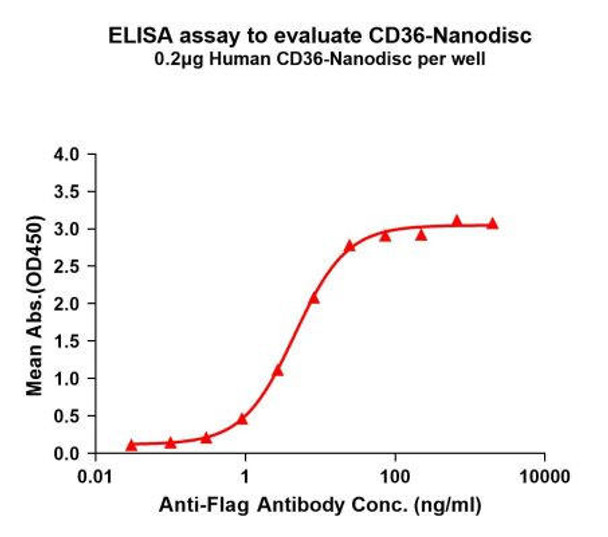Nanodisc Human CD36 Protein (HDFP025)
- SKU:
- HDFP025
- Product Type:
- Recombinant Protein
- Protein Type:
- Full-Length Bioactive Membrane Protein
- Species:
- Human
- Uniprot:
- P16671
Frequently bought together:
Description
system_update_altDatasheet
| Product name | Human CD36 full length protein-synthetic nanodisc |
| Size: | 10ug |
| Product SKU: | HDFP025 |
| Product Category | Full Length Transmembrane Proteins |
| Target: | CD36 |
| Uniprot: | P16671 |
| Description: | Human CD36 full length protein-synthetic nanodisc |
| Molecular Weight: | The human full length CD36 protein has a MW of 53.1 kDa |
| Protein Family: | Druggable Genome, Transmembrane |
| Protein Pathways: | Adipocytokine signaling pathway, ECM-receptor interaction, Hematopoietic cell lineage, PPAR signaling pathway |
| Storage & Shipping: | Store at -20°C to -80°C for 12 months in lyophilized form. After reconstitution, if not intended for use within a month, aliquot and store at -80°C (Avoid repeated freezing and thawing). Lyophilized proteins are shipped at ambient temperature. |
| Synonyms: | BDPLT10; CHDS7; FAT; GP3B; GP4; GPIV; PASIV; SCARB3 |
| Expression System: | HEK293 |
| Formulation: | Lyophilized from nanodisc solubilization buffer (20 mM Tris-HCl, 150 mM NaCl, pH 8.0). Normally 5% - 8% trehalose is added as protectants before lyophilization. Please see Certificate of Analysis for specific instructions. |
| Background: | The protein is the fourth major glycoprotein of the platelet surface and serves as a receptor for thrombospondin in platelets and various cell lines. Since thrombospondins are widely distributed proteins involved in a variety of adhesive processes, this protein may have important functions as a cell adhesion molecule. It binds to collagen, thrombospondin, anionic phospholipids and oxidized LDL. It directly mediates cytoadherence of Plasmodium falciparum parasitized erythrocytes and it binds long chain fatty acids and may function in the transport and/or as a regulator of fatty acid transport. Mutations in this gene cause platelet glycoprotein deficiency. Multiple alternatively spliced transcript variants have been found for this gene. |
| Delivery: | In Stock |
| Usage | Research use only |






